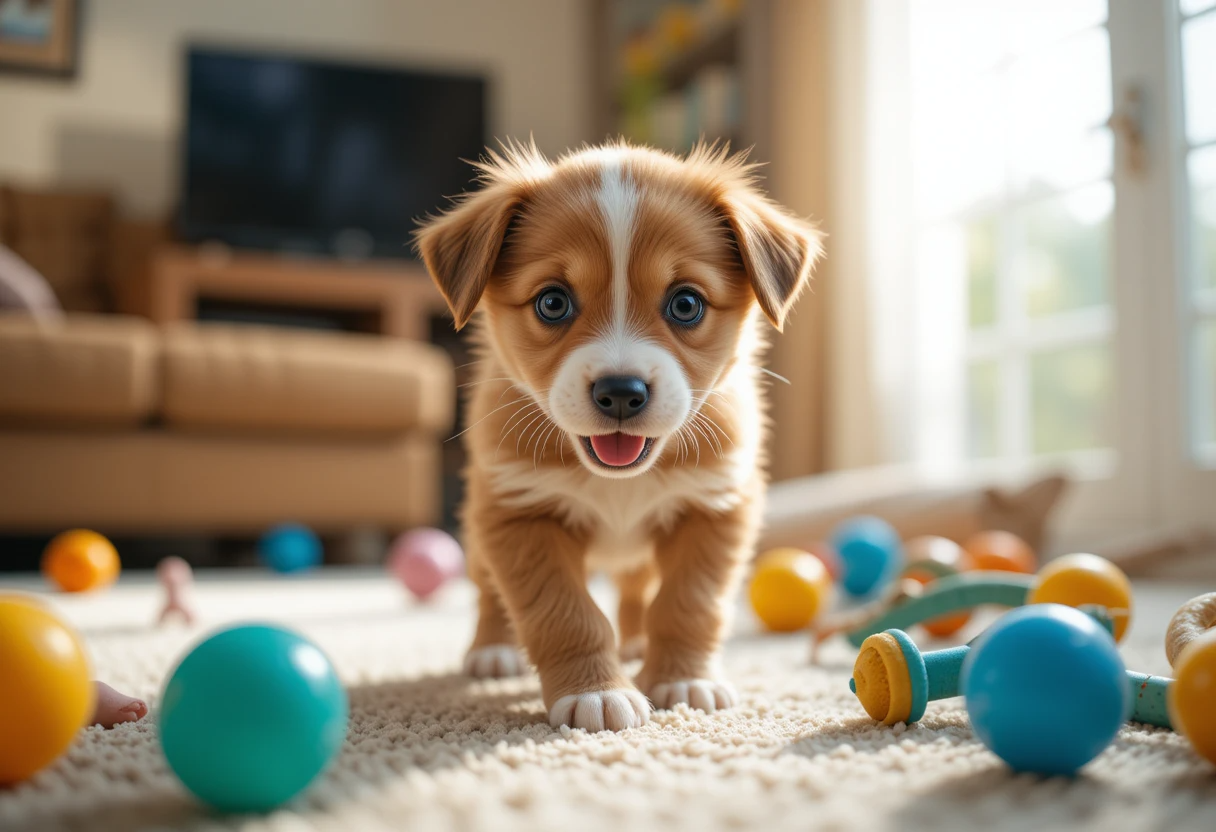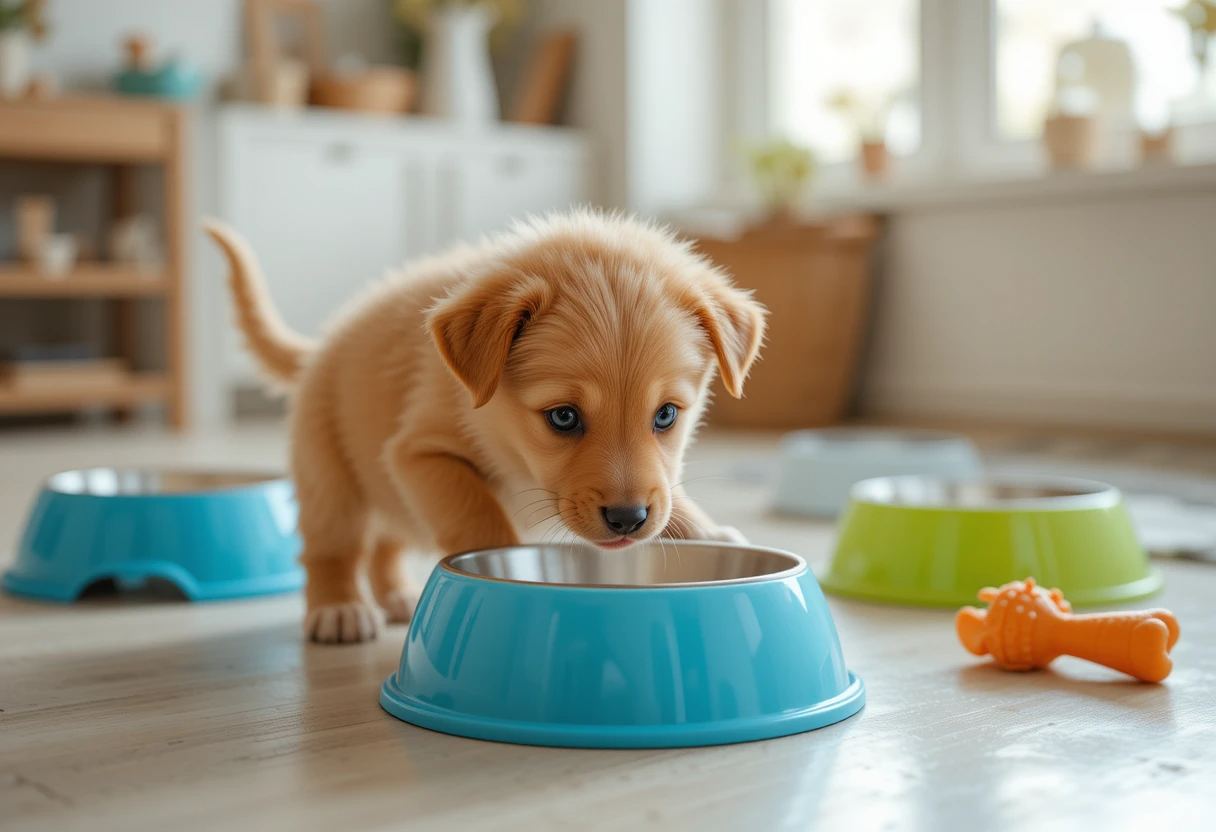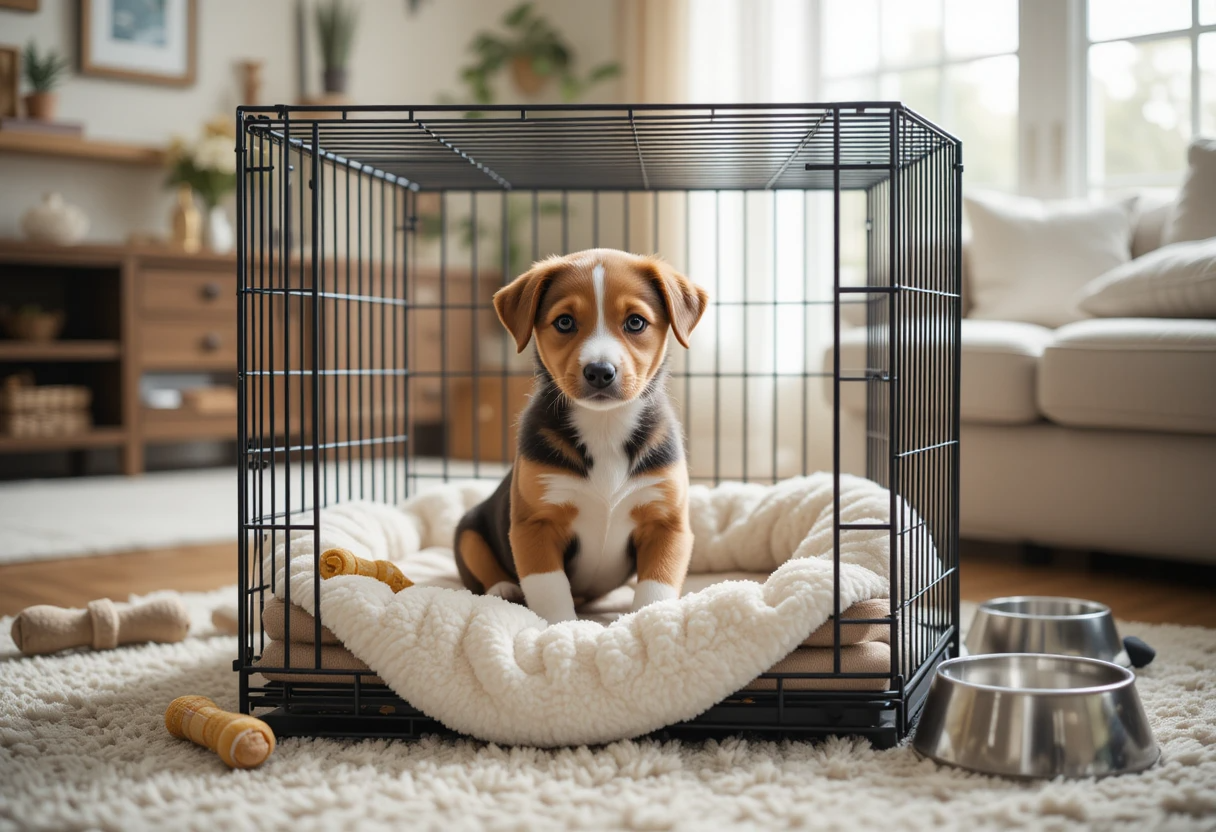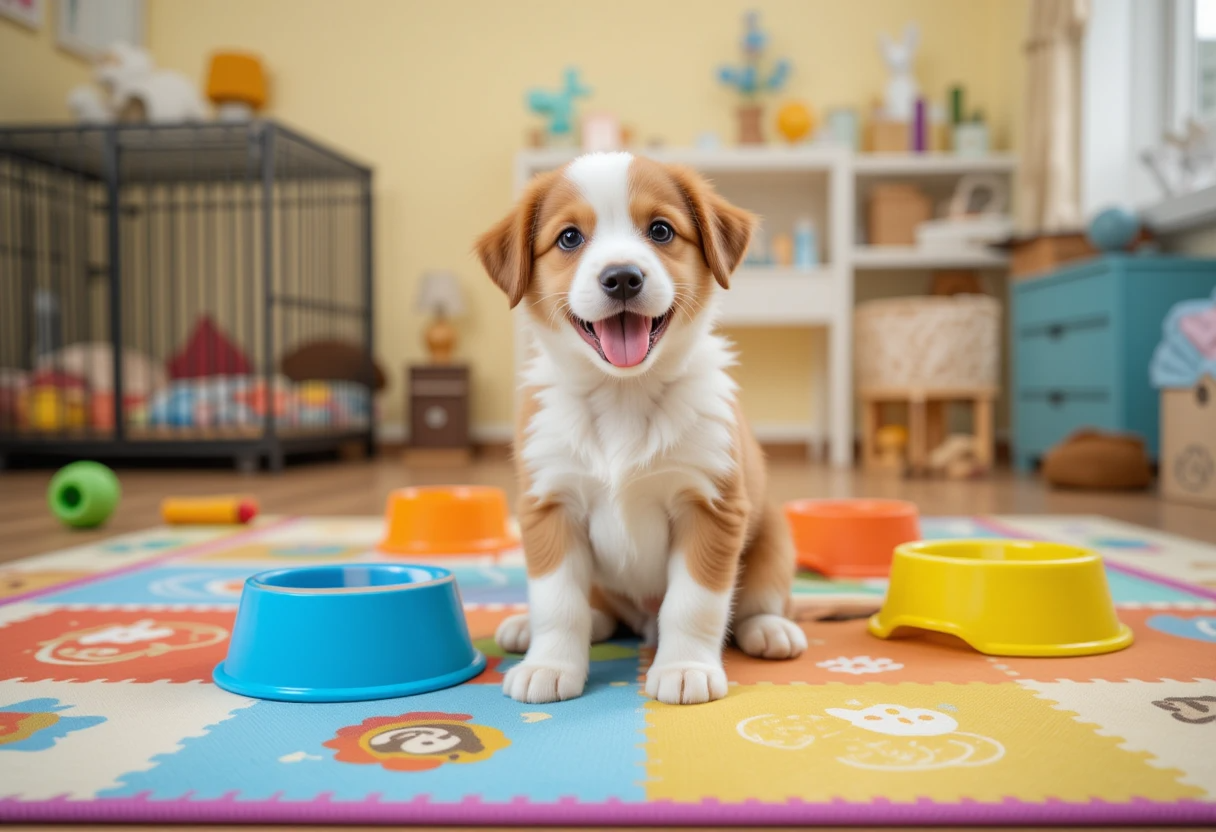Puppy Schedule 8 Weeks is crucial for every new puppy owner. Bringing home an 8-week-old puppy is a thrilling milestone filled with adorable moments, but it also marks the beginning of a critical developmental period. At this tender age, puppies are just starting to navigate the world independently, having recently left their mother and littermates. Establishing a consistent schedule during these formative weeks isn’t just convenient—it’s essential for your puppy’s development, training success, and long-term well-being.
A well-structured puppy schedule provides security through predictability, helps prevent behavioral issues, accelerates house training success, and builds the foundation for a lifetime of good habits. In this comprehensive guide, we’ll walk through every aspect of creating an optimal daily routine for your 8-week-old puppy, covering everything from feeding and potty breaks to play sessions, training, and appropriate rest periods.
Understanding Your 8-Week-Old Puppy’s Development
Before diving into scheduling specifics, it’s important to understand what’s happening developmentally with your 8-week-old puppy.

Physical Development
At 8 weeks, puppies are in a period of rapid growth. Their motor skills are improving daily, though they may still be somewhat uncoordinated. Their baby teeth are coming in strong, and they’re experiencing an intense teething phase that will continue for several months. Their sensory abilities, including sight, smell, and hearing, have developed significantly but are still refining.
Their immune systems are still developing, making them vulnerable to diseases. This is why vets recommend beginning vaccination protocols around this age. Additionally, their ability to regulate body temperature is still immature, so they require appropriate environments that aren’t too hot or cold.
Mental & Emotional Development
The 8-12 week period is known as the “fear imprint stage”—a critical socialization window where puppies are particularly receptive to new experiences. Positive exposures during this time can shape their future responses to people, places, and situations.
At this stage, puppies have short attention spans but are eager learners. They’re naturally curious and will explore their environments enthusiastically. Their capacity for forming attachments is strong, which is why this is an ideal time to build your bond.
Puppies this age are still learning appropriate play behaviors and bite inhibition, skills they began developing with their littermates. They may be easily distracted, but their brains are like sponges, ready to absorb new information and experiences.
The Fundamental Components of a Puppy Schedule 8 Weeks

1. Feeding Schedule
Proper nutrition is crucial for your puppy’s development. At 8 weeks old, puppies should eat specifically formulated puppy food that meets their unique nutritional requirements.
Recommended Feeding Pattern:
- Frequency: Feed your puppy 3-4 times per day at consistent times
- Portions: Follow the feeding guidelines on your puppy food packaging, adjusting based on your puppy’s breed, size, and activity level
- Timing: Space meals evenly throughout the day (e.g., 7 AM, 12 PM, 5 PM, and optionally 9 PM)
- Food Type: High-quality puppy food formulated for your dog’s size (small, medium, or large breed)
A typical puppy feeding schedule might look like:
- 7:00 AM: Breakfast
- 12:00 PM: Lunch
- 5:00 PM: Dinner
- (Optional) 8:00 PM: Small evening meal (especially for smaller breeds)
Nutritional Requirements:
Puppies need a balanced diet with higher protein and fat content than adult dogs. Look for puppy foods that specifically mention they meet AAFCO (Association of American Feed Control Officials) standards for growth. Most puppy foods contain:
- Higher protein (25-30%) for muscle development
- Higher fat (15-20%) for energy and brain development
- Appropriate calcium and phosphorus ratios for proper bone growth
- DHA for brain and vision development
Important Feeding Tips:
- Measure food precisely to prevent overfeeding
- Provide constant access to fresh, clean water
- Avoid feeding table scraps or human food
- Monitor your puppy’s weight and body condition weekly
- Pick up any uneaten food after 20 minutes to establish routine
- Wait approximately 30 minutes after meals before active play to prevent bloat
2. Potty Training Schedule
Consistent potty breaks are essential for successful house training. An 8-week-old puppy has limited bladder control and needs frequent opportunities to eliminate outside.
When to Take Your Puppy Out:
- First thing in the morning
- 10-15 minutes after each meal
- After waking from naps
- After playtime or exercise
- Before bedtime
- During the night (at least once or twice for an 8-week-old)
- Every 1-2 hours when awake
A common rule of thumb is that puppies can hold their bladder approximately one hour for each month of age, plus one. So an 8-week-old puppy (about 2 months) may need to eliminate every 3 hours maximum.
Potty Training Tips:
- Take your puppy to the same spot each time to establish a bathroom area
- Use a specific cue word like “potty” or “go time” while they’re eliminating
- Praise and reward immediately after they finish, not when you return inside
- Supervise your puppy indoors or keep them contained to prevent accidents
- Never punish accidents; simply clean thoroughly to remove odors
- Consider using the 10-10-10 rule: 10 minutes in the yard, confined to a 10-foot potty area, with 10 minutes of supervision
3. Sleep Schedule
Adequate sleep is critical for your puppy’s development and behavior. An 8-week-old puppy needs 18-20 hours of sleep per day, including nighttime sleep and multiple daytime naps.
Typical Sleep Pattern:
- Nighttime: 8-10 hours (with 1-2 potty breaks)
- Daytime: 8-10 hours split into several naps (typically after meals, play, or training)
Creating an Effective Sleep Routine:
- Establish a designated sleeping area with a comfortable crate or bed
- Create a consistent bedtime routine (e.g., potty break, quiet time, then bed)
- Keep the sleeping area quiet and slightly darkened
- Consider a heartbeat toy or ticking clock to mimic littermate presence
- Use a crate or pen to prevent wandering and accidents during sleep
- Plan for 1-2 overnight potty breaks, gradually extending time as the puppy matures
4. Play and Exercise Schedule
While exercise is important, it’s crucial not to over-exercise a young puppy. Short, frequent play sessions are ideal for an 8-week-old.
Appropriate Exercise:
- 5-10 minute play sessions several times throughout the day
- Short indoor exploration time
- Gentle introduction to leash and collar/harness (a few minutes at a time)
- Supervised yard exploration
Suitable Play Activities:
- Short fetch games with soft toys
- Gentle tug-of-war (teaching “drop it” from the start)
- Hide-and-seek with treats or toys
- Rolling balls for chasing
- Simple interactive toys appropriate for puppies
Exercise Guidelines:
- Avoid forced exercise like jogging or long walks
- Minimize jumping and stair climbing, which can harm developing joints
- Monitor for signs of fatigue (lagging behind, panting heavily, lying down)
- Provide short rest periods between play sessions
- Never exercise your puppy immediately after eating
5. Training and Socialization Schedule
Early positive training and socialization are essential for raising a well-adjusted adult dog.
Training Sessions:
- Keep sessions very short (2-5 minutes)
- Train multiple times throughout the day
- Focus on one skill at a time
- Use positive reinforcement (treats, praise, play)
Essential Early Training:
- Name recognition
- Sit command
- Coming when called
- Gentle leash walking
- Basic handling and grooming tolerance
- Crate training
Socialization:
While it’s important to protect your puppy from disease until fully vaccinated, controlled socialization is crucial during this critical window.
Safe Socialization Activities:
- Exposing your puppy to various household sounds (vacuum, TV, etc.)
- Allowing them to walk on different surfaces (tile, carpet, wood, grass)
- Introducing them to friendly, vaccinated dogs
- Arranging meetings with various people (different ages, appearances)
- Car rides to experience motion
- Carrying them outdoors to observe the world from safety
- Puppy kindergarten classes with vaccinated participants
Sample Daily Schedule for an 8-Week-Old Puppy
Here’s a detailed example of what a daily schedule might look like for your 8-week-old puppy:
6:00-7:00 AM:
- Wake up and immediate potty break
- Cuddle and gentle play time
- Breakfast
- Potty break (10-15 minutes after eating)
7:30-9:00 AM:
- Short training session (2-3 minutes)
- Free play time with appropriate toys
- Potty break
- Nap time (1-2 hours)
9:00-10:30 AM:
- Potty break after waking
- Supervised exploration/play session
- Brief training moment (name recognition, sit)
- Potty break
- Nap time
11:30 AM-1:00 PM:
- Potty break after waking
- Lunch
- Potty break (10-15 minutes after eating)
- Calm play or interaction time
- Potty break
- Nap time
1:30-3:00 PM:
- Potty break after waking
- Play session with toys
- Brief training session (2-3 minutes)
- Socialization activity (meet new person, experience new sound)
- Potty break
- Nap time
3:30-5:00 PM:
- Potty break after waking
- Interactive play session
- Brief training practice
- Dinner
- Potty break (10-15 minutes after eating)
- Play time or exploration
5:30-7:00 PM:
- Short socialization opportunity
- Potty break
- Nap time
7:00-9:00 PM:
- Potty break after waking
- Quiet play time (winding down for the evening)
- Optional small meal (if doing 4 meals per day)
- Potty break
- Start settling down for bedtime
9:00 PM:
- Last potty break
- Bedtime in crate or designated sleeping area
Overnight:
- One potty break around 1:00-2:00 AM
- Another potty break around 4:00-5:00 AM (gradually extending time as puppy grows)
If you want to learn more about training service animals, check out our detailed guide on How to Become a Psychiatric Service Dog Trainer in 2025.
Crate Training Your 8-Week-Old Puppy
Crate training is an invaluable tool for house training, preventing destructive behaviors, and providing your puppy with a safe space.

Getting Started with Crate Training:
1. Choose the right crate: It should be just large enough for your puppy to stand, turn around, and lie down comfortably. For larger breeds, consider a crate with a divider to adjust as they grow.
2. Make it inviting: Place soft bedding, a toy, and perhaps an item with your scent inside. Some puppies benefit from having the crate partially covered to create a den-like atmosphere.
3. Introduce gradually:
- First, let your puppy explore the crate with the door open
- Place treats and toys inside to create positive associations
- Feed meals near or inside the crate
- Practice short closed-door sessions while you’re present
- Gradually extend time in the crate
4. Establish a crate routine:
- Use the crate for nap times and overnight sleeping
- Always take your puppy directly from the crate to their potty spot
- Never use the crate for punishment
- Create a specific phrase for crate time, like “kennel up” or “crate time”
5. Prevent negative associations:
- Ignore whining (unless it might indicate a potty need)
- Provide appropriate chew toys in the crate
- Never force your puppy into the crate
- Make exits from the crate low-key to prevent excitement about leaving
Socialization: The Critical Window
The period between 8-16 weeks represents the prime socialization window for puppies. During this time, they’re most receptive to new experiences and developing comfort with various aspects of the world.
Socialization Checklist for 8-Week-Old Puppies:
- People: Exposure to various ages, genders, appearances (hats, beards, glasses, uniforms)
- Sounds: Household appliances, traffic, thunderstorm recordings, children playing
- Surfaces: Different flooring types, grass, concrete, metal, wood, carpet
- Objects: Umbrellas, balloons, bags, bicycles, strollers
- Handling: Gentle touching of ears, paws, tail, mouth (foundation for grooming and veterinary care)
- Animals: Properly vaccinated, friendly dogs of different sizes and breeds
- Environments: Different rooms in your home, car interior, quiet outdoor spaces
While protecting your puppy from disease is important, finding safe ways to socialize is essential. Consider:
- Inviting vaccinated dogs to your home
- Carrying your puppy in public areas (avoiding dog parks or areas with unknown dogs)
- Puppy socialization classes that require vaccination proof
- Drive-by socialization (observing the world from the safety of your car)
For quick and easy ways to crate train your puppy during the night, check out our detailed guide on Kennel Training Puppy at Night: Quick & Easy Tips for Fast Results.
Health and Veterinary Care
Your puppy’s first weeks at home should include proper veterinary care to ensure they start life healthy.

Vaccination Schedule:
At approximately 8 weeks, puppies typically receive their first set of vaccinations, including:
- DHPP (Distemper, Hepatitis, Parainfluenza, Parvovirus)
- Bordetella (kennel cough) in some cases
Follow-up vaccines will be scheduled by your veterinarian, usually at 12 and 16 weeks.
Parasite Control:
- Deworming should begin around 2-3 weeks of age and continue as recommended by your vet
- Flea and tick prevention typically starts around 8 weeks, depending on the product
First Veterinary Visit:
Schedule your puppy’s first check-up within a week of bringing them home. The vet will:
- Perform a complete physical examination
- Check for parasites
- Administer appropriate vaccinations
- Discuss nutrition and growth
- Answer questions about care and development
Mental Stimulation and Enrichment
Mental stimulation is just as important as physical exercise for a growing puppy. Providing appropriate enrichment helps prevent boredom, reduces problem behaviors, and supports cognitive development.
Age-Appropriate Mental Enrichment:
- Puzzle toys: Simple treat-dispensing toys appropriate for puppies
- Snuffle mats: Encourage natural foraging behaviors
- Food-dispensing toys: Make mealtime engaging and slower
- Sensory experiences: Introducing new scents, textures, and sounds
- Training games: Simple hide-and-seek with treats or toys
- Novel objects: Regularly rotate toys to maintain interest
For an 8-week-old puppy, keep enrichment activities short (5-10 minutes) and relatively simple. As they grow and develop more skills and confidence, you can gradually increase complexity.
If you’re new to puppy training, check out our guide on the Top 10 Easiest Puppies to Train for Beginners in 2025 to find the perfect furry friend to start with.
Common Challenges and Solutions
Challenge: Nighttime Crying
Solution: Create a comfortable sleeping environment, possibly with a heartbeat toy, ticking clock, or warm (not hot) water bottle wrapped in a towel. Place the crate in or near your bedroom initially so your puppy can sense your presence. Gradually move it to the desired location once they’re comfortable.
Challenge: Nipping and Biting
Solution: Puppies explore with their mouths and are learning bite inhibition. When they bite too hard, yelp or say “ouch” in a high-pitched voice and temporarily stop play. Redirect to appropriate chew toys. Be consistent—everyone in the household should follow the same rules.
Challenge: Potty Training Accidents
Solution: If accidents occur, it’s usually a matter of inadequate supervision or missing potty break opportunities. Increase vigilance, take your puppy out more frequently, and watch for pre-elimination signals like circling, sniffing, or suddenly leaving play. Never punish accidents; simply clean thoroughly with an enzymatic cleaner.
Challenge: Separation Anxiety
Solution: Begin teaching independence from day one by practicing brief separations. Leave your puppy in their crate or a safe area for short periods while you’re home, gradually increasing duration. Make departures and arrivals low-key to avoid reinforcing anxiety.
Challenge: Overwhelming Energy Levels
Solution: Ensure your puppy is getting enough sleep (18-20 hours daily). An overtired puppy often becomes hyperactive or “zoomie.” Implement regular nap times in the crate or quiet area. Balance play with rest and monitor for signs of fatigue.
Adjusting the Schedule as Your Puppy Grows
While this guide focuses on 8-week-old puppies, it’s important to recognize that your puppy’s needs will evolve as they mature. Here’s how to adjust your schedule as your puppy grows:
12 Weeks:
- Reduce to 3 meals per day
- Extend time between potty breaks to 3-4 hours
- Increase training session duration to 5-7 minutes
- Add more complex play and training activities
16 Weeks:
- Continue with 3 meals daily
- Potty breaks every 4-5 hours during the day
- May sleep through the night without potty breaks
- Introduce more structured leash walks (15-20 minutes)
6 Months:
- Transition to 2 meals per day
- Further increase exercise duration
- Expand training to include more advanced commands
- Consider beginning formal obedience training
Special Considerations for Various Breeds
Different breeds may require adjustments to the standard schedule:
Small Breeds:
- May need more frequent meals (4 per day for longer)
- Often house train more slowly due to smaller bladder size
- May need additional warmth due to less body mass
- Usually require less exercise but benefit from multiple short play sessions
Large Breeds:
- Need controlled exercise to protect developing joints
- Require large-breed specific puppy food to control growth rate
- May sleep more deeply and for longer periods
- Often mature more slowly despite their size
Working/High-Energy Breeds:
- Need additional mental stimulation
- Benefit from structured activities that satisfy breed-specific instincts
- Require more consistent training from an early age
- May need additional socialization to prevent fearfulness or reactivity
Building a Strong Foundation Through Consistency
Consistency is the cornerstone of successful puppy raising. When everyone in the household follows the same schedule and rules, your puppy learns faster and develops confidence in understanding expectations.
- Use the same words for commands
- Maintain consistent mealtimes
- Follow the same bedtime routine
- Apply the same rules about furniture access, greeting behaviors, etc.
- Ensure all family members participate in care and training
Remember that investment in establishing routines during these early weeks pays enormous dividends in your dog’s future behavior and your relationship.
For more detailed information on the puppy vaccination schedule and health care tips, you can visit the American Veterinary Medical Association’s guide on puppy vaccinations.
FAQs
Most 8-week-old puppies need to eliminate every 2-3 hours, meaning they’ll typically need 1-2 potty breaks during the night. Take them directly outside, keep interactions minimal and calm, then return them to their sleeping area. As they grow, their bladder capacity will increase, and they’ll gradually sleep longer stretches. How often does an 8-week-old puppy need to go potty at night?
What is a good schedule for an 8-week-old puppy?
A good schedule includes 3-4 meals daily at consistent times, potty breaks every 1-2 hours when awake and after sleeping/eating/playing, 18-20 hours of total sleep (including naps), short play sessions, brief training moments, and socialization opportunities. The key is consistency and meeting your puppy’s physical and developmental needs.
What is the 10-10-10 rule for potty training puppies?
The 10-10-10 rule means: spend 10 minutes outside in a designated 10-foot potty area, followed by 10 minutes of close supervision indoors. This focused approach helps establish potty habits by giving adequate time to eliminate outdoors and preventing indoor accidents through watchful supervision.
What should an 8-week-old puppy’s bedtime routine be?
An effective bedtime routine includes a final meal 2-3 hours before bedtime, a play session to expend energy, a last potty break, and settling into their sleeping area with minimal stimulation. Consider a comfort item like a heartbeat toy, and place the crate near your bedroom initially. Expect to wake for 1-2 potty breaks during the night.
What is the best food for an 8-week-old puppy?
The best food for an 8-week-old puppy is a high-quality puppy formula specifically designed for their breed size (small, medium, or large). Look for products that meet AAFCO standards for growth, contain DHA for brain development, and have appropriate calcium/phosphorus ratios. Consult your veterinarian for specific recommendations based on your puppy’s breed and needs.
You can learn more about the unique traits and health considerations by reading our detailed post on Merle Great Dane: Beautiful or Risky? Genetics, Health & Care Truths.
Conclusion
Creating a consistent and appropriate Puppy Schedule 8 Weeks lays the groundwork for a well-adjusted, happy adult dog. During these formative weeks, your 8-week-old puppy is developing physical abilities, forming behavioral patterns, and building the foundation of your relationship together.
Remember that flexibility within your Puppy Schedule 8 Weeks is important—your puppy is an individual with unique needs. While maintaining consistency in the core schedule elements, be prepared to make minor adjustments based on your puppy’s personality, breed characteristics, and developmental pace.
The effort you invest now in establishing a clear Puppy Schedule 8 Weeks, providing appropriate care, and creating positive experiences will be rewarded many times over throughout your dog’s life. With patience, consistency, and love, your 8-week-old puppy will grow into a confident, well-behaved companion who brings joy to your home for years to come.
If you want your puppy to sleep peacefully, check out our Best Crate Schedule for Puppy at Night: Sleep Peacefully with This Easy Routine to create a calm bedtime habit.

